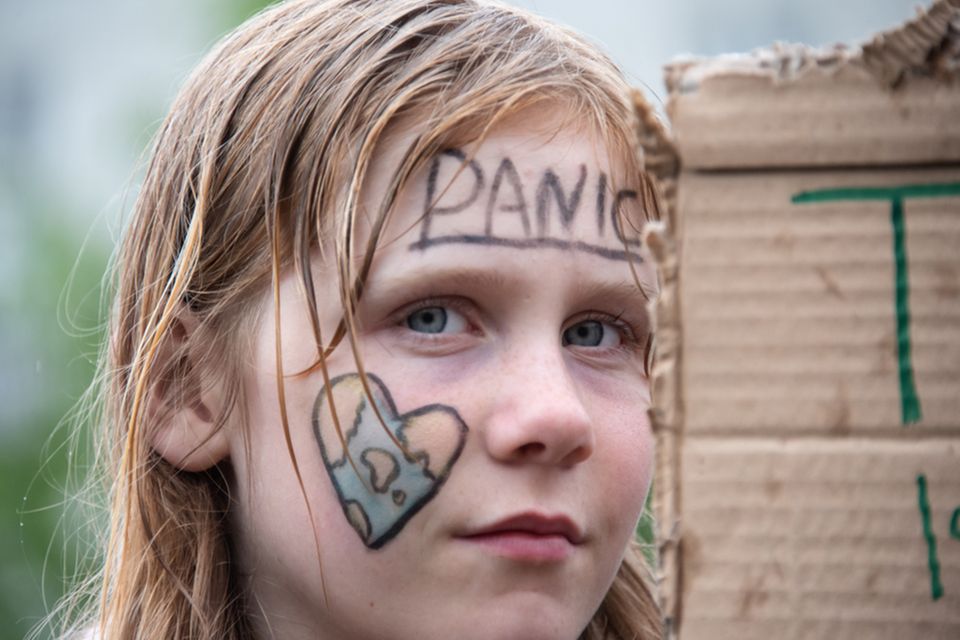Climate change is a real threat to our lives – and yet we don't seem to take it seriously enough. Why is that? This explains psychologist Dr. Leon Windscheid.
Floods, droughts and economic disasters are threatened – but climate change doesn't seem to worry us. On the contrary: we don't seem to take the dangers of global warming seriously.
Why is that? We wanted to understand that and got Dr. Leon Windscheid asked. The psychologist and author ("Hey brains! Why we tick, how we tick", Heyne-Verlag, 9.99 euros) knows the secrets of our psyche. He became known throughout Germany in 2015 when he won the million at Günther Jauch.
Scientists are certain that climate change is the greatest threat to the world – and the majority of people seem to be cold. How come
This can be illustrated by a simple example: Just imagine a green and a blue circle. The green circle kills twelve people once, the blue circle kills 74,000 people every year. Which circle are you more afraid of?
Most would say that the blue circle scares them more because it demands more victims. And now the translation: The green circle that kills twelve people is Anis Amri, the terrorist who drove through the Christmas market in a truck in Berlin. The blue circle is the result of alcohol consumption.
One terrorist kills twelve people and the consequences of alcohol consumption cost 74,000 lives every year. Most people are afraid of the terrorist – but nobody is afraid of beer!
But why is that?
We misjudge risks. We always have to be afraid of something, but at some point there is no fear left. That is why we fear the terrorist and not the consequences of global warming. In contrast to the terrorist, I cannot photograph climate change, it is not so easy to grasp. Terror works instantly. A melting iceberg is far away, but terror on the Christmas market is close to me.
Climate change is an incredibly complex topic that hardly anyone can fully grasp – is that why we find it so difficult to grasp the danger?
No, I would disagree. We have never known so much about the climate and its development as we do today. And it's easy to understand: the sun heats the earth, the ice melts, the sea level rises – everyone should be able to understand that.
We can rationally understand what the experts are telling us. But: What the experts say does not suit us. Our brain rejects everything that it does not understand or that does not suit it.
But then our brains should understand that there is a great danger …
No, because our brains are not interested in rules and laws. It cares about what is "normal". And for us it is normal to express your status with a fat car or to take a selfie at the airport on the way to vacation to show what you are experiencing. That was our normal for a long time. If we are to understand that we now have to behave completely differently, our brain would have to admit a mistake – and our brain hates mistakes!
There are people who even deny climate change and suspect wild conspiracy theories behind it – what might drive these people?
We have to keep reminding ourselves that our brain is 300,000 years old. There are instincts involved, a lot happens unconsciously and irrationally. The brain just reacts to feelings better. That's why we don't care about a starving polar bear on an ice floe. But woe, after a bad summer, the fries get more expensive – then Germans freak out!
That is why terrorism is so powerful: Terror has had a massive impact on our lives – we notice that, for example, during security checks at airports. Climate change, on the other hand, has not yet had any major effects on our lives here in Germany, so some do not want it to come true.
Here Greta Thunberg is doing such a valuable service with "Fridays for Future". Greta says: "I don't want to give you any hope, I want you to panic!" At this point it is right and important that it scares us.

Of course, we all don't like to be scared. But fear can be very valuable when it is aimed at the right dangers because it really reaches and moves us. A survey showed that in January 10 percent of Germans were still afraid of climate change and in April this was 26 percent. This shows how fear has shifted through "Fridays for Future". When enough people are scared, real movement can come in.
Nevertheless, Greta is repeatedly attacked and with the striking students, people talk more about not going to school than about how we can save the world …
Yes, that shows how weird the debate is now. People prefer to talk about what she looks like than what she achieves. And why is that? My parents' generation, who are now around 60, now have their own mistakes mirrored. And as already mentioned: our brain hates mistakes!
Greta has already achieved a lot – now it's no longer cool, it's embarrassing to post a selfie from the airport. This shows that we are a good bit further!
